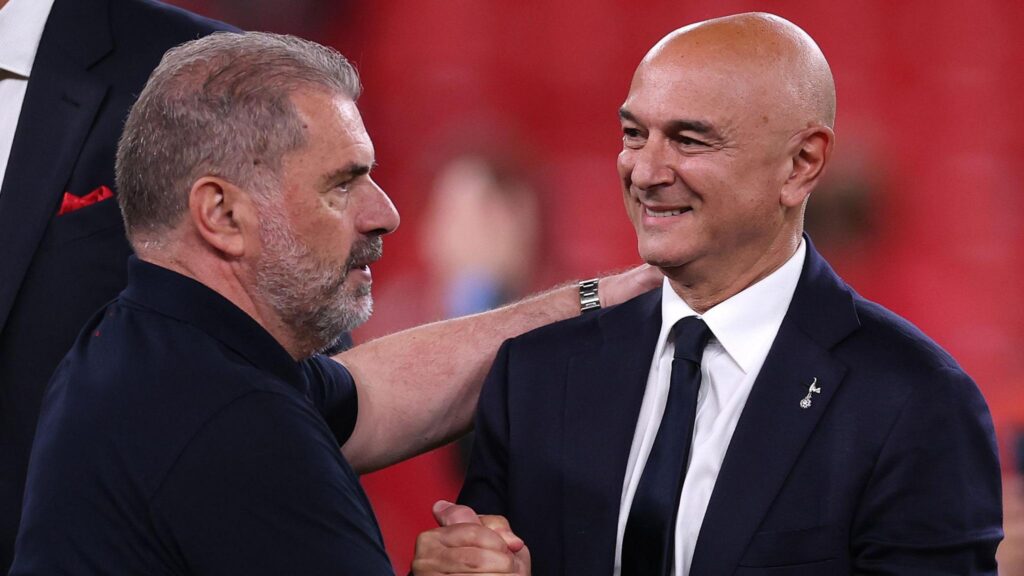In a heartfelt statement, Tottenham Hotspur chairman Daniel Levy expressed his emotional turmoil surrounding the dismissal of manager Ange Postecoglou, particularly following his leadership that secured the club’s first major trophy in 17 years. Levy articulated that this decision was not made lightly, especially as it came just sixteen days after Postecoglou guided Spurs to a significant 1-0 victory against Manchester United in the UEFA Europa League final, held in Bilbao. This triumph marked an important chapter in Tottenham’s recent history and stirred considerable feelings within the club’s hierarchy as they faced the need for a change.
Postecoglou’s departure followed a disappointing domestic season, where the team’s performance resulted in a lackluster finish, placing them dangerously at 17th in the Premier League standings. The Australian manager’s exit coincided with the club’s ambition to enhance their competitive edge, which culminated in the appointment of Thomas Frank, the former Brentford manager, as his successor. Levy, looking back on Postecoglou’s tenure, expressed no regrets about having appointed him in the first place. He acknowledged the impressive fifth-place finish during Postecoglou’s initial season and the subsequent trophy win, stating, “I don’t regret appointing Ange, I’m very grateful to Ange.”
Despite Postecoglou’s achievements, Levy emphasized Tottenham’s driving need to compete across all fronts, stating that a shift was essential for the club’s growth and success. He elaborated on the emotional weight of the decision, mentioning, “Emotionally, it was difficult, but we feel that we’ve made the right decision for the club.” This sentiment underscores the challenging nature of leadership in modern football, where results often dictate management decisions, irrespective of previously achieved successes.
Transitioning to the future, Levy welcomed Thomas Frank into the fold, marking him as the thirteenth permanent manager during his 25-year tenure at Tottenham. Reflecting on his extensive experience in the role, Levy asserted, “I’ve got very broad shoulders,” affirming his commitment to the club and its aspirations. Failure, he indicated, was not part of his narrative; rather, the focus was firmly on achieving success, something that becomes paramount, especially in a sport where the pressures are ever-present.
Thomas Frank, now charged with leading Tottenham, has penned a contract that will see him at the helm of the club until 2028. Levy and Tottenham’s newly appointed chief executive, Vinai Venkatesham, played integral roles in the hiring process, underscoring the thorough search that yielded Frank as the top candidate from a pool of over 30 potential managers. Venkatesham shared that they identified ten crucial traits necessary for a successful manager at Tottenham, leading to a focused analysis of candidates before selecting Frank, who was deemed “absolutely the number one candidate.”
Venkatesham expressed excitement about Frank’s capabilities, particularly his track record in developing young talent, hinting at the potential for cultivating the current Tottenham squad under his guidance. Levy highlighted Frank’s intelligence, excellent communication skills, and technical knowledge as core components that made him an appealing choice to lead a new chapter for Spurs, particularly after achieving success in winning a trophy last season.
The amalgamation of Levy’s reflective sentiments about Postecoglou and anticipatory remarks concerning Frank’s potential usher in a fascinating era for Tottenham Hotspur. As the club embarks on this new journey, the football community will undoubtedly remain observant, eager to see how the changes implemented by management will reinvigorate the team’s competitive spirit in the Premier League and beyond. The narrative surrounding managerial stability, club aspirations, and the emotional undercurrents of such decisions encapsulates not only the challenges faced by Levy but also the complexities of modern football management.



